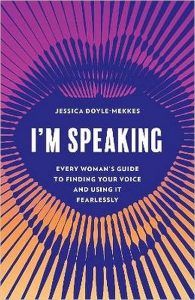Excerpt from I’m Speaking: Every Woman’s Guide to Finding Your Voice and Using It Fearlessly
I’m Speaking: Every Woman’s Guide to Finding Your Voice and Using It Fearlessly
 I’m Speaking is every woman’s guide to creating a clear, confident voice that is authentically hers and then using it fearlessly.
I’m Speaking is every woman’s guide to creating a clear, confident voice that is authentically hers and then using it fearlessly.
Full of effective, efficient, brain-science-based ways to make positive changes to your voice, in your head and coming out of your mouth, I’m Speaking also teaches the reader how to fearlessly use that voice, personally and professionally: ask for what you want and get what you need, speak up against toxicity, communicate everything better, have the difficult conversations, and cultivate resilience.
Imagine a world without the voices of Maya Angelou, Malala Yousafzai, Gloria Steinem, your mother, your best girlfriend, your midwife, your hair stylist. Do you know a woman whose voice isn’t essential to her career, her family, the world? Women’s voices are essential, and they are powerful. Every woman can harness that power. This is the only book written that gives women the exact tools necessary to solve the common vocal problems they face, and literally reprogram their brains and bodies to be more confident when speaking.
Think of how much more centered, how much more confident you would be knowing that you can deliver your message in a voice that makes people want to listen to you. Knowing that, regardless of situation, you can speak clearly and confidently, stay on track (or get back on), relax your body, and even enjoy the moment you’ve worked so hard for. Your voice is the secret weapon to success you’ve always had, but never knew how to use, til now.
Excerpted from I’m Speaking: Every Woman’s Guide to Finding Your Voice and Using It Fearlessly, by Jessica Doyle-Mekkes. Rowman & Littlefield Publishers, 2023. Reprinted with permission.
OTHER HABITS TO BREAK NOW
Upspeaking
Upspeaking is when declarative statements have a rising intonation at the end, making them sound more like a question. Say, “Today is Thursday,” and take note of what your voice does near the end of the statement. If the sound of your voice—your pitch—gets lower, then you are using downspeak. If your pitch gets higher, making it sound less like a statement and more like a question, you are using upspeak. Upspeak may make you seem less confident. Are you sure it’s Thursday?
In her essay “Language in Society,” UC Berkeley professor of linguistics Robin T. Lakoff explores how gender stereotypes condition women’s speech. From her research, Lakoff identified that women often use what she refers to as “empty adjectives”: adjectives that are vague and convey positivity, such as “gorgeous” or “adorable.” Women also frequently use “tag questions,” which require confirmation from someone else. Asking “Tina is here, isn’t she?”—when you know damn well that Tina would never miss an open bar and is probably already elbows deep in a Grey Goose martini while flirting shamelessly with the bartender who is young enough to be her son—is a tag question.
If your goal is to simply offer your ideas and knowledge like vegetables to a four-year-old, so they can be considered then flung onto the kitchen floor in favor of a simple carb covered in cheese, upspeaking, empty adjectives, and tag questions are exactly how you do it.
I Just Really Feel Like You Should Stop Apologizing (Does That Make Sense?)
Starting a sentence with “I feel like” is taking your argument, no matter how supported and well thought out, and turning it into a hunch. You may be intending to create discussion or to invite others to share their feelings, but what happens instead is that it ends the conversation. You can’t argue with feelings.
“I just really feel like the return of Sex and the City fell flat without Kim Cattrall.”
“No, it didn’t. It’s HBO’s most-streamed series ever.”
“Yeah, but I felt like it did.”
How do you respond to that? That’s right, you don’t. The conversation is over. This may not present a problem when discussing unimportant things like a television show (not to say the SATC revival wasn’t important; believe me, I know how important it was), but it becomes a major issue when discussing say, why you should get a raise, why you’re the best candidate for the job, or why a relationship needs to come to an end.
You don’t “feel like” you deserve more money; you’ve been driving 70 percent of the company’s revenue for the last eighteen months. You don’t “just feel like” you can give little Quinn the seven-year-old superhero-mermaid-cheerleader-themed sleepover birthday of her dreams; you have a portfolio of all the incredible parties you’ve planned and a mile-long list of glowing client testimonials. And you certainly don’t “just really feel like” you need to end things with Steve. The man thinks the vulva is a car; it’s time.
It’s also time to stop apologizing, especially at work. Now, don’t get it twisted: If you ate Alexa’s clearly labeled lunch out of the communal fridge or backed into Modie’s car in the parking lot, you owe her an apology, but it’s time to stop apologizing when you haven’t done anything wrong.
I see this all the time with my female college students. A young woman gets up to sing and before the first notes of the piano are even played, she apologizes for her voice which is “a little off” that day or that she is “just getting over a cold” or that “this might not be that good.” Well, I don’t know about you, but I can’t wait to see her performance!
Her apology is a safety net in case things don’t go as planned, which I totally get. Using your voice can be scary. Unfortunately, instead of catching her if she falls, that safety net is setting the expectation that she will. Imagine going to the new Meryl Streep movie and the opening credits say, “Starring Meryl Streep (sorry, this may not be her best work).” Ridiculous! Meryl works without a net, and so can you.
According to sociologist Dr. Maya Jovanovic in her popular TEDx talk on the subject, overapologizing occurs out of a desire to seem polite. “Often times we think, ‘Oh I’m being polite, they’re going to perceive me as being a kind human being,’” Jovanovic said in a 2021 interview. “But in fact, we are perceived in the complete opposite way. In actuality, we are seen as not confident, as insecure, doubtful and incompetent.” Constant apologizing minimizes you and your accomplishments. Trust me, the one thing you don’t need to be is smaller.
Does that make sense? Yes, you make sense. Unless your audience has the brainpower of a Pet Rock or you are speaking Elvish, you are making sense. If you don’t, someone will ask you to clarify.
BUY HERE
—
 Jessica Doyle-Mekkes, MM is the Head of Musical Theatre at East Carolina University where she has taught voice since 2017. Jessica has spent the last 15 years studying the human voice and working as a vocal coach for actors, singers, and public speakers. Every day her clients see how finding their own voices has empowered other aspects of their lives from their careers to family life, relationships and even how they parent their children.
Jessica Doyle-Mekkes, MM is the Head of Musical Theatre at East Carolina University where she has taught voice since 2017. Jessica has spent the last 15 years studying the human voice and working as a vocal coach for actors, singers, and public speakers. Every day her clients see how finding their own voices has empowered other aspects of their lives from their careers to family life, relationships and even how they parent their children.
An internationally published writer and sought after clinician, her debut book, “I’m Speaking” is being released October, 2023 (Rowman & Littlefield). Jessica works as a speaker, advisor, and clinician to individuals, groups, NGO’s and businesses teaching women how to harness the power of their voices: in their heads & out of their mouths. She is a graduate of Central Michigan University
Jessica lives in Greenville, NC with her husband Don, their daughters Tallulah and Jolie, and a codependent chihuahua named Sebastian. Please connect with Jessica Doyle-Mekkes at: https://www.jessicadoylemekkes.com/
Category: Contemporary Women Writers, On Writing























